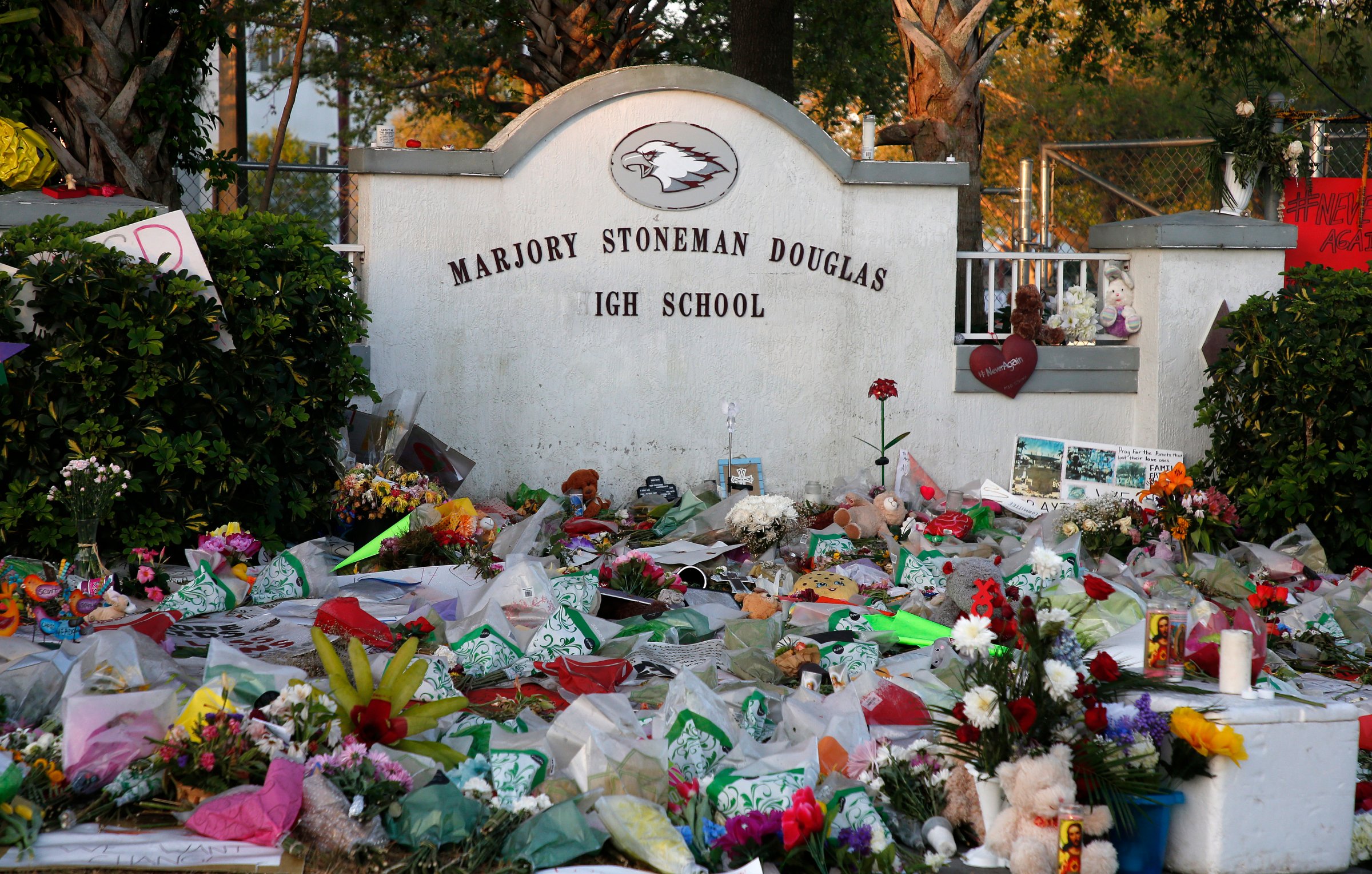
At least one clothing brand believes the names of American tragedies are high fashion.
Bstroy (or (b).stroy), a rising streetwear label from Atlanta designers Brick Owens and Dieter Grams, presented its Spring 2020 collection, dubbed “Samsara,” during New York Fashion Week on Sept. 15. During the runway presentation, a series of four models wore collegiate-style hoodies, emblazoned with the names of schools and colleges where mass shootings have occurred: Stoneman Douglas, Columbine, Virginia Tech and Sandy Hook.
The hoodies also appeared distressed, with tears and holes that many on social media took to resemble bullet holes.
On his Instagram, Owens shared a photo of the collection’s show notes, which are commonly used to explain a designer’s inspiration and the reasoning behind the collection.
“Sometimes life can be painfully ironic. Like the irony of dying violently in a place you considered to be a safe, controlled environment, like school,” the note says. “‘Samsara’ is the cycle we must transcend to reach Nirvana.”
In a statement sent to TIME, Bstroy’s co-founder Grams said that he and Owens are using their platform to shed light on important issues — in this instance specifically, the statement says, they hoped to go deeper than the “surface layer” conversations on gun violence in schools.
“We wanted to make a comment on gun violence and the type of gun violence that needs preventative attention and what its origins are,” the statement read of their newest designs, “while also empowering the survivors of tragedy through storytelling in the clothes.”
They did not immediately respond to a follow-up question as to whether Bstroy had consulted with any survivors of the shootings named on the hoodies.
Bstroy recently appeared in a New York Times profile highlighting trendsetters in the streetwear industry. “We are making violent statements,” the designers told the Times. “That’s for you to know who we are, so we can have a voice in the market. But eventually that voice will say things that everyone can wear.”
The spring 2020 collection also included two T-shirts with the slogan “BSTROY COMBAT SCHOOL.” Three other shirts featured what appear to be gun violence-themed tabloid newspaper covers. One model was also styled as though bleeding from a wound at his throat.
The Times profile noted that gun motifs, and commentary on gun violence, has also featured in the label’s previous collections, citing “graphic T-shirts that nod to preppy interests like tennis and fencing, but with the sports gear replaced by guns.”
Fashion designers have long incorporated provocative, politicized messaging and imagery into their clothes. In an August profile in The Face, Bstory cite their debut 2013 fashion show, which they presented in an Atlanta subway station, as an example of this. They said in that show they wanted to highlight what they say as the city’s failing public transportation system and what “they attribute to the Republican state’s desire to keep black people in the inner city.”
Criticism of the designs has mounted after the label shared the collection on social media.
Delaney Tarr, a survivor of the Marjory Stoneman Douglas high school shooting in Parkland and March for Our Lives co-founder, called the hoodies “disgusting” and “unacceptable” in a tweet.
“This is just absolutely horrific,” an account dedicated to Victoria Soto, a teacher killed in the shooting at Sandy Hook elementary school, tweeted. “A company is make light of our pain and other’s pain for fashion.”
“Under what scenario could somebody think this was a good idea?” added Fred Guttenberg, father of Parkland victim Jamie Guttenberg. Parkland survivor Cameron Kasky echoed these sentiments in an Instagram comment, noting incredulously that “there were multiple people who thought this was a good idea.”
Survivors, loved ones, and those with connections to all four shootings have been among those leaving incensed comments.
“There are so many ways to use fashion and clothing to make sociopolitical commentary—this isn’t it. How do you think the parents who saw their children’s clothing with bullet holes through them feel seeing this?,” one comment read.
“The dudes who are gonna be wearing this hoodie aren’t activists who wanna spread awareness. They’re just tryna flex. It’s all materialism, no activism,” another person commented.
In the statement to TIME, Grams noted that the hoodies ” were initially intended to be just for the show,” but that in light of the response the brand is now considering putting them for sale. Similar garments currently for sale on the label’s website are listed at $210.
“Something interesting happens when making a statement so loud about something so obviously sensitive,” Grams said to TIME, acknowledging the backlash. “People get the opportunity to form their opinions before they get all the information… People seem to want to release hateful energy as a default, rather than waiting to hear an explanation.
“Our image as young black males has not been traditionally awarded credit for introducing avant-garde ideas, [and] many people have assumed our message to be lazy just because of what they’ve been taught about black men,” he continues. “These hoodies were made with all of these intentions in mind. To explore all of these societal issues… [and] the different ways that we relate to each other and the dated ideas that still shape the assumptions we make about each other.”
“Art’s job is to wring emotion out,” Grams concludes. “What we do with it after is subjective and on us.”
More Must-Reads from TIME
- Why Biden Dropped Out
- Ukraine’s Plan to Survive Trump
- The Rise of a New Kind of Parenting Guru
- The Chaos and Commotion of the RNC in Photos
- Why We All Have a Stake in Twisters’ Success
- 8 Eating Habits That Actually Improve Your Sleep
- Welcome to the Noah Lyles Olympics
- Get Our Paris Olympics Newsletter in Your Inbox
Write to Josiah Bates at josiah.bates@time.com